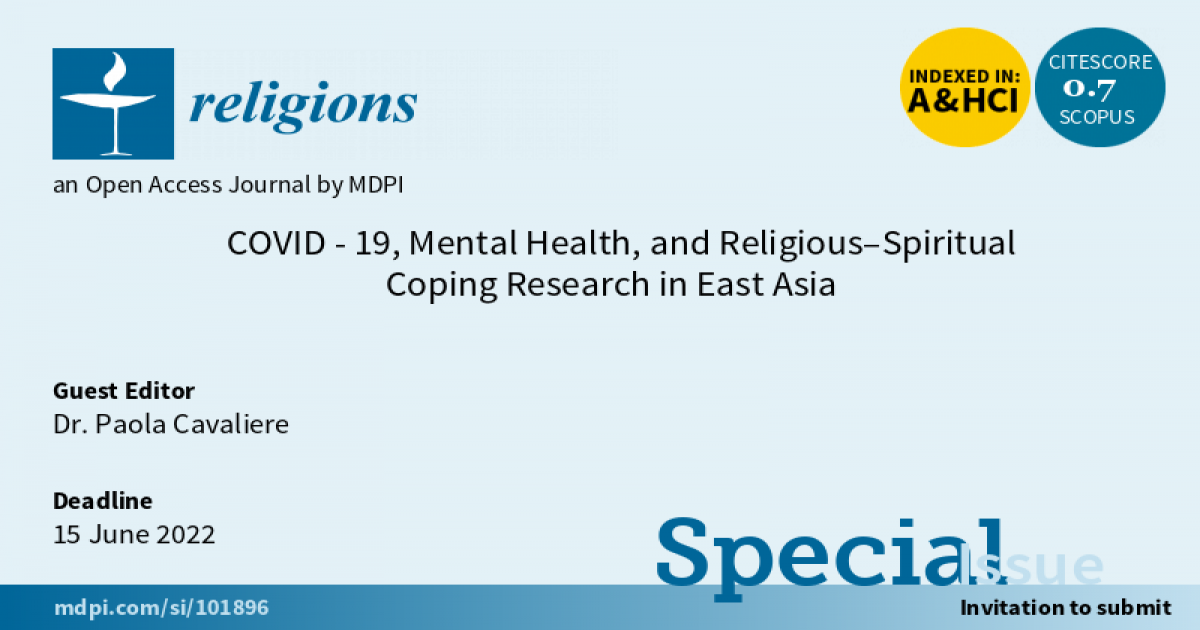COVID-19, Mental Health, and Religious–Spiritual Coping Research in East Asia
A special issue of Religions (ISSN 2077-1444). This special issue belongs to the section "Religions and Health/Psychology/Social Sciences".
Deadline for manuscript submissions: closed (15 June 2022) | Viewed by 4590

Special Issue Editor
Special Issue Information
Dear Colleagues,
The COVID-19 pandemic is having, and will continue to have, important consequences not only on the physical health but also on the mental health of the population. While the mechanisms underlying the association between spirituality, religiosity, and emotional health outcomes are not yet completely understood (Büssing 2019), spirituality and religiosity have already been positively correlated with individuals’ capacity to adapt and cope with the difficulties and stressors of the pandemic (Lucchetti et al. 2020; Ferrell et al., 2020). As such, spirituality and religiosity are identified as sources of resilience in that they enable individuals to enact strategies improving subjective well-being and quality of life. This Special Issue focuses on the experiences of individuals in East Asia—defined here as the broader East Asia-Pacific context– and how they have used religiosity and spirituality as coping mechanisms for COVID-19 pandemic-induced emotional distress. Despite the progress in the field over the past year, East Asian contexts have received unequal attention thus far, as is also testified by the limited number of studies published on this topic (Cavaliere 2021; Edara et al. 2021; Kato and Shaw 2020). With this Special Issue of Religions, the Guest Editor aims to offer a framework for qualitative and theoretically oriented approaches to the interplay between religion, spirituality, and mental health in populations in East Asia in response to the pandemic.
I welcome the submission of papers using qualitative and quantitative research incorporating situated intersectional and socio-economic analysis in their discussions. Contributions should focus on the mediating effect of religious and spiritual coping mechanisms for COVID-19 pandemic-induced emotional distress while exploring what personal, geopolitical, socio-economic, and temporal locations of the particular individual or communities interrelate with such a search. I encourage contributors to be guided by the following research questions: What prompts a search for religious and spiritual coping mechanisms against stress and emotional distress to gain some degree of subjective control and well-being? What religious or spiritual coping strategies and mechanisms have individuals in East Asia engaged in that assist them during the pandemic? Some example topic areas that this Special Issue is prioritizing are the following:
- The role of spirituality and religion as contributors to emotional well-being outcomes during the pandemic;
- Intersectional approaches (e.g., gender identity, socio-economic condition, social expectations, social processes, policies, or institutional practices) to the availability of and access to spiritual and religious coping mechanisms during the pandemic;
- Typology of spiritual and religious coping mechanisms in East Asia;
- Spiritual and religious coping strategies of religious minorities and emerging spiritual orientations (e.g., spiritual but not religious) as well as unstudied or marginalized populations;
- Analysis of the providers of religious and spiritual coping mechanisms: religious or spiritual leaders, teachers, chaplains, medical staff, and others;
- Spiritual and religious care in clinical settings during the pandemic;
- The implications of spiritually oriented coping mechanisms for religiously affiliated individuals and vice versa;
- Challenges or barriers to addressing spiritual and religious coping mechanisms during the pandemic;
- Addressing spiritual and religious coping mechanisms across the lifespan from children to the older adult population.
The Guest Editor requests that, prior to submitting a manuscript, interested authors initially submit a proposed title and an abstract of 400–600 words summarizing their intended contribution. Please send it to the Religions Editorial Office (religions@mdpi.com) and to the Guest Editor (pcavaliere@hus.osaka-u.ac.jp). Abstracts will be reviewed by the Guest Editor for the purposes of ensuring a proper fit within the scope of this Special Issue. Full manuscripts will undergo double-blind peer review.
References
Büssing, Arndt. 2019. Measuring Spirituality and Religiosity in Health Research, in Lucchetti, Giancarlo, Prieto Peres, Mario Fernando, Damiano and Rodolfo Furlan (Eds.) Spirituality, Religiousness and Health London: Springer , pp. 11-31
Cavaliere, Paola (2021). Building Emotional Resilience: Japanese Women’s Religious and Spiritual Coping Strategies in the Time of COVID-19. Religions, 12(9), 723, https://doi.org/10.3390/rel12090723
Edara, Inna R., del Castillo Fides, Ching Gregory S., del Castillo Clarence D. 2021. Religiosity, Emotions, Resilience, and Wellness during the COVID-19 Pandemic: A Study of Taiwanese University Students. Int. J. Environ.Res. Public Health, 18(6381), https://doi.org/10.3390/ijerph18126381
Ferrell Betty R., Handzo George, Picchi Tina, Puchalski Christina and Rosa William E. 2020. The urgency of spiritual care: COVID-19 and the critical need for whole-person palliation. Journal of Pain and Symptom Management 60(3), e7–e11. https://doi. org/10.1016/j.jpainsymman.2020.06.034
Kato, Akiko and Shaw, Rajib. 2020. Yoga and stress management during and post COVID-19 urban lifestyle in Japan. Asian Journal of Complementary and Alternative Medicine 8(3): 48-54
Lucchetti, Giancarlo, Góes, Leonardo Garcia, Amaral, Stefani Garbulio, Terzian Ganadjian, Gabriela, Andrade, Isabelle, de Araújo Almeida, Paulo Othávio, do Carmo, Victor Mendes and Gonzalez Manso, Maria Elisa. 2020. Spirituality, religiosity and the mental health consequences of social isolation during COVID-19 pandemic, International Journal of Social Psychiatry, Online First: 1-8, https://doi.org/10.1177/0020764020970996
Dr. Paola Cavaliere
Guest Editor
Manuscript Submission Information
Manuscripts should be submitted online at www.mdpi.com by registering and logging in to this website. Once you are registered, click here to go to the submission form. Manuscripts can be submitted until the deadline. All submissions that pass pre-check are peer-reviewed. Accepted papers will be published continuously in the journal (as soon as accepted) and will be listed together on the special issue website. Research articles, review articles as well as short communications are invited. For planned papers, a title and short abstract (about 100 words) can be sent to the Editorial Office for announcement on this website.
Submitted manuscripts should not have been published previously, nor be under consideration for publication elsewhere (except conference proceedings papers). All manuscripts are thoroughly refereed through a double-blind peer-review process. A guide for authors and other relevant information for submission of manuscripts is available on the Instructions for Authors page. Religions is an international peer-reviewed open access monthly journal published by MDPI.
Please visit the Instructions for Authors page before submitting a manuscript. The Article Processing Charge (APC) for publication in this open access journal is 1800 CHF (Swiss Francs). Submitted papers should be well formatted and use good English. Authors may use MDPI's English editing service prior to publication or during author revisions.
Keywords
- COVID-19
- mental health
- religion
- spirituality
- East Asia





